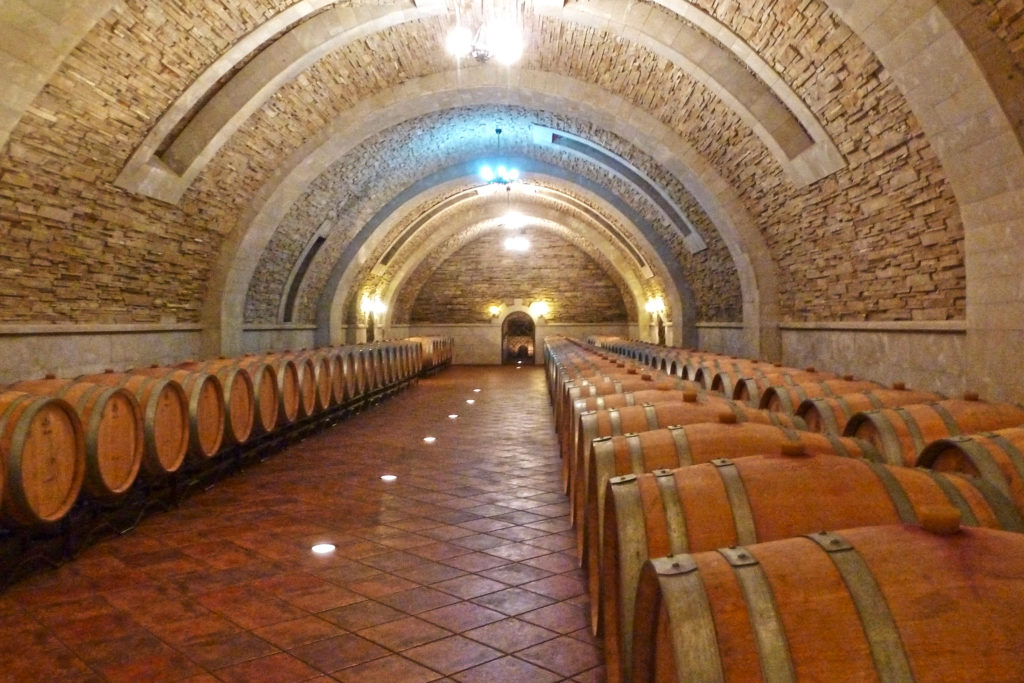Tucked away in an obscure corner of Eastern Europe is an old winery whose wine has been known to trip off the taste buds of royalty. Despite a tough political climate, the quality of Purcari wine is winning out.
Queen Victoria was supposedly rather partial to a drop of Negru de Purcari. It’s a suave, ruby-coloured red wine with a most unexpected origin: Moldova.
I travel through the Purcari region in the back of a sky-blue Lada I’d managed to thumb down, trying not to wince as we bounce over blemishes in the unpaved road.
Talk during the journey is scant; traditional Romanian peasant music tumbles from the speakers in frenetic rolls. Klezmer on crack. My companions are four rather burly locals, one of whom sits on the knee of her husband, practically engulfing him, to make space for me. Kindness is as common as money is scarce out here.
The land on the Dniester River’s alluvial plains is fertile but the people in this part of Moldova exist in a deeper state of poverty than perhaps anywhere else in Europe: Water is still drawn from wells and almost half of the houses, many of which lack electricity, are falling into ruin, devoured by nature. Many people moved away in search of opportunity. Others left long ago fleeing war and never returned.

The vineyards at Purcari winery (Photo: Paul Stafford)
Chateau on the hill
I walk the last mile to the winery. The fields look as though they were tilled by hand until I come upon the first vineyard. Pristine rows of vines unfurl up a gentle hill to an immaculate white building (or “chateau,” as they call it), which seems to belong to another era; the vestiges perhaps of a more munificent time.
Wine is quite possibly Moldova’s proudest product. The main airport was recently renamed Wine of Moldova Airport after a public poll. Although it is only the world’s 20th largest wine exporter, which may not sound so impressive, the adversity through which this has been achieved in recent decades certainly is.
From a shaded spot by the hilltop winery of Purcari I look east. Ukraine is less than a mile away across the dirty ribbon of the Dniester. Less than a mile beyond that meandering stretch of river is another border, unrecognised by the UN, but very much a divide between two nations to all who live in the area; Transnistria officially broke away from Moldova after an acrimonious and bloody civil war in 1992.
This has become a deeply complicated region of Europe. Things aren’t helped by the fact that Moldova is caught between the grappling superpowers of Russia and the European Union, much in the same way that neighbouring Ukraine currently is.

Queen Elizabeth II’s Wine Collection under lock and key (Photo: Paul Stafford)
The Queen’s Wine
Picking any side is a losing battle and Nicolas, who shows me around the spotless winery, prefers to talk about lighter topics. “Purcari is on the same latitude as the Burgundy region in France,” he says. Consequently, grape varieties such as Pinot noir and Chardonnay have been imported and grown successfully.
The indigenous Rara Neagra grape, when combined with Cabernet Sauvignon to create the Negru de Purcari, is what gives Purcari wine the unique body and colour that is seemingly so beloved by British Royalty.
“Queen Victoria tried it at the 1878 Paris World Expo,” says Nicolas. She wasn’t the only one impressed as it was awarded the expo’s gold medal for wine by an international panel.
As I enter the cellars, which are far smaller than some of the huge subterranean labyrinths to be found elsewhere in Moldova, Nicolas points out a collection of bottles locked behind an iron gate. “This is the Queen Elizabeth II Collection, some of which dates back to 1947.” He is certainly quite proud of this fact, but behind that pride there’s a hint of hope that such stories can help drive interest in Purcari’s wine beyond the geopolitical deadlock.
Russia banned wine imports from Moldova when they cozied up to the other side, so Moldova’s wine producers courted the West. Last year’s election brought pro-Russian candidate Igor Dodon to power, which swung the pendulum back towards Moscow and now vintners are having to turn back East.

A selection of wines from Chateau Purcari (Photo: Dominic Lockyer via Flickr)
Purcari however has put most of its grapes in the western basket. Their Freedom Blend was initially created to commemorate 20 years of independence from Russia in 2011. It contains grapes from Georgia, Moldova and Ukraine, which ironically are all countries that have suffered directly from Russian-backed aggression since 1991. Unsurprisingly, it has sold rather well in western countries like Britain.
As I emerge from a wine tasting room, a little tipsy after overindulging in some rather delightful Negru de Purcari, I feel as though I have a moment of clarity; wine making, like politics, is a delicate balancing act. The passions of the day are like the seasons, volatile and impossible to tame. Purcari may have some uncertain times ahead. The hope is that both the weather and the politics do not get too tempestuous.

Dereliction is a common sight around Purcari (Photo: Paul Stafford)
